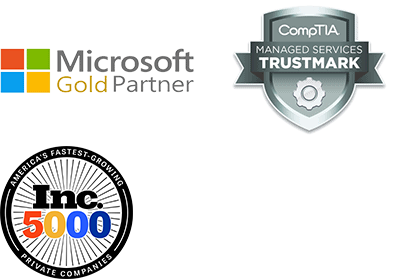If you’re like most people, you don’t think about your technology until it breaks. When something starts breaking repeatedly and frequently, i.e. server downtime or workstations crashing, it becomes a constant worry in the back of your mind and takes up all your time. That’s no way to get to sleep at night.
IT services are similar. Fully managed is your all-you-can-eat option: for a fixed monthly price, you get unlimited, proactive support. Time-and-materials services charge à la carte, based on what you use. Hybrid IT managed services is a mix of fully managed and time-and-materials. You have a flat fee but are charged for support calls.
There are pros and cons to each. We’ve broken them down to help you determine which service fits your needs best.
Fully Managed IT Services
Fully managed IT services – the all-you-can-eat buffet – offers the ongoing monitoring, maintenance, and expertise you need for your business without the expense of building a full, internal IT department. The type and depth of talent are critical features that all managed service providers should be judged on.
Pros:
- Fixed price gives provider incentive to minimize the number of calls you place for support, leading to higher staff productivity
- Full-service IT partner who proactively supports all levels of your organization from business goals to help desk support
- Strategic guidance to offer recommendations and align technology with business objectives, like Applied Tech’s ROADmap services
- 24/7 monitoring of servers and workstations to reduce technology issues and help desk calls
- Business continuity, backup, and disaster recovery planning
- Access to enterprise-grade hardware and software
- Built-in security throughout your network
- Easily accessible and well-staffed help desk for assistance
- Vendor management
- More established providers offer breadth and depth of expertise across technology mediums like cloud and security
- Provider actively works to prevent outages and downtime
- Stable, fixed monthly cost
Cons:
- Perceived as more expensive because the provider prevents issues, so you rarely call
- Smaller managed service providers can’t provide robust strategic guidance and lack the depth of expertise within their technical staff due to the size of the company.
Hybrid IT Services
Hybrid IT managed services are useful for companies with a few in-house resources. Small IT departments are typically overloaded, and if your team members lack the expertise to address a problem, they may spend hours researching a resolution, lengthening your downtime.
Under this hybrid model, your provider partially manages your network, and you are charged for support desk calls. The type and depth of talent are critical features that all managed service providers should be judged on.
Pros:
- A dedicated team of IT experts is on call when you need them. There is no need to search out firms and try to contract expertise when your systems are down and users are upset.
- Some offer strategic support for your business with access to high-cost enterprise-grade IT tools.
- Easily accessible and well-staffed help desk for assistance
- Don’t have to hire a full IT department to access expertise across your IT needs
- Optional management activities for firewalls, the cloud, and vendors
- Creates more bandwidth for the internal tech team to focus on user support
Cons:
- Unproductive relationship if your IT team is unwilling to approach the MSP with issues
- Time and material charges can get expensive if the internal IT staff is not trained well and needs a lot of support
- Smaller managed service providers will likely not provide robust strategic guidance and/or have deep expertise within their technical staff due to the size of the company
Time and Materials
Generally, when people pick time and materials, they think they won’t need IT services and they’ll never be charged. This can cause significant problems when the unexpected occurs. Like every order from an à la carte menu, you are charged for each help desk and remediation call you make.
Pros:
- You only spend money when something goes wrong
Cons:
- IT service provider is not incentivized to proactively manage your network
- We’ve actually seen vendors not prevent viruses because they only profit from fixing damage
- Small problems often grow into large ones because of the user’s desire to keep expenses down.
- Issues fester causing frustration with users and often result in large expenses when the problem is finally reported.
- No or minimal strategic guidance for your IT
- Difficulty estimating IT budget
- Unpredictable costs when repairing technology issues
- Increased risk of cybersecurity threats
- More frequent downtime
The best IT management option is the one that aligns with your company culture, existing IT support, and organizational needs. Wondering where your organization fits? Take our free IT comparison quiz! As you evaluate your options, factor in the cost of the unknown. You never know when or how technology issues will arise.
No two buffets are created equal. Contact Applied Tech below and learn what’s on the menu.





